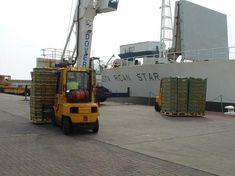
Industry players went head to head with Defra officials on fresh produce import legislation on Wednesday, and pushed for answers to their “grave concerns” about whether Defra will be able to implement fully EU plant heath import legislation.
The meeting, in Reading, quickly descended into a blame game surrounding the ministry’s “completely unrealistic” proposals.
Serious doubts about the resources available to implement fully the inspections, spiralling costs, and whether Defra will ever be able to carry out the plant health import legislation properly, were voiced from the floor.
Brian Ellam, from the Plant Heath and Seed Inspectorate, came under fire for giving “vague” responses to the doubts of the trade.
But Defra has revised the length of its pre-notification and inspection periods for imported produce, revealed last week, following claims that the proposed maximum wait of three days for seafreighted produce would have serious detrimental effects on fresh produce businesses and the wider supply chain.
The pre-notification period for seafreighted produce will now stand at three working days, to achieve a 24-hour clearance.
The maximum hold time will depend on whether the required pre-notification is given, and on when the port or inland inspection point gets the consignment to the approved inspection facilities, Ellam said.
Those requiring product to be cleared outside working hours - generally from 8.30am to 5pm, excluding weekend and bank holidays - will have to fork out for an out-of-hours inspection.
Inspectors will be able to opt for auto-clearance for the consignments that they do not have the resources to check, excluding high-risk items such as potatoes, as a temporary measure until enough manpower is brought in to reach 100 per cent inspection.
Nigel Jenney, chief executive of the Fresh Produce Consortium (FPC), chaired the meeting. He said: “We are facing mounting costs, huge backlogs at ports and empty shelves. We have grave concerns about the full implementation of plant health regulations, but it is only through a dialogue between government and industry that we can achieve results. We need to have a constructive discussion.”
Trade representatives at the event called for a consultation with Defra to try to resolve the issues. Jim Rogers, who manages importer Fesa UK and sits on the FPC board, told freshinfo: “What importers are looking at is a huge escalation of problems, including costs, the dramatic effect of delays and their impact on highly perishable product.
“There is far more to be done before the trade really understands what it needs to do. Defra is following clear policy lines, but I am not sure it knows what the answers are,” he added.
The procedures are set to be rolled out fully at the end of the month



